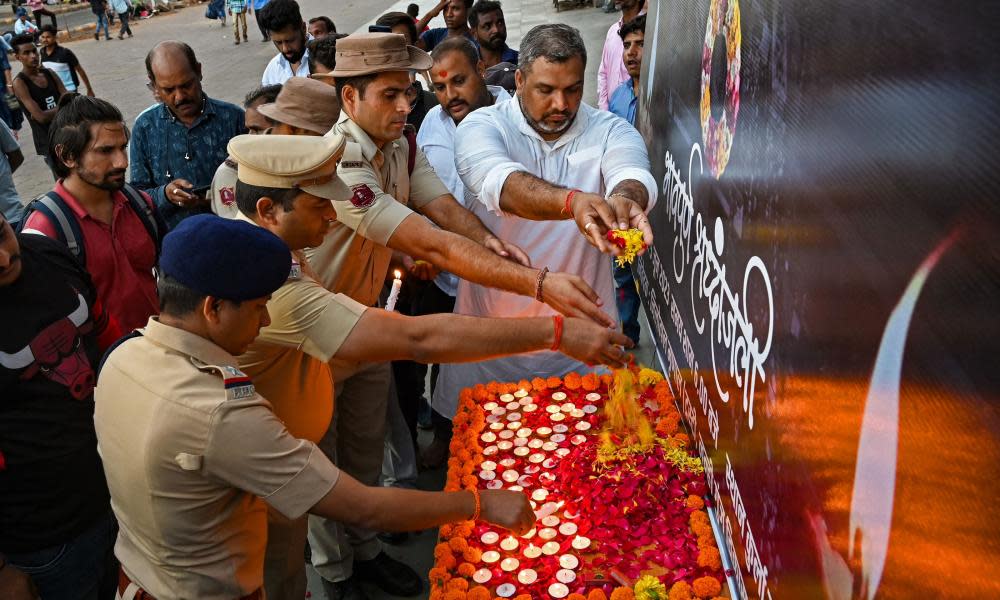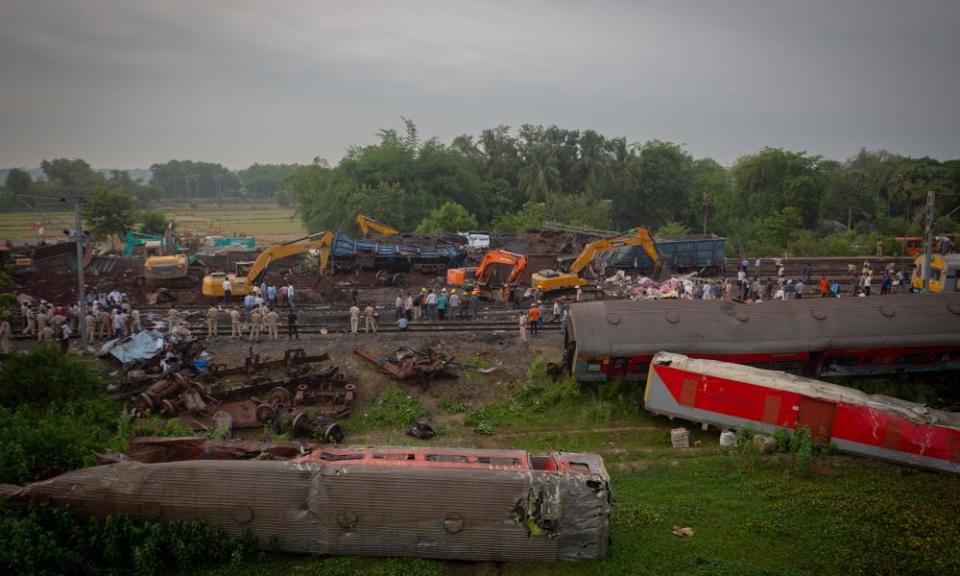Brothers, breadwinners, fathers: the lives lost in India’s train disaster

Stretching 40,000 miles, India’s train lines are often described as the pulsing arteries of the country, carrying life, work and opportunity from the icy upper reaches of the Himalayas to the coconut groves of the south.
Though hundreds of small regional airports have cropped up and domestic air travel has boomed, the train is the only affordable option to traverse the country that is almost the size of Europe for the majority of its 1.4 billion people.
Many of the 1,250 passengers onboard the Coromandel Express last Friday were facing a long and arduous journey. The train began at Shalimar, in the eastern state of West Bengal and was due to travel more than 1,000 miles to its final destination of Chennai, in Tamil Nadu state in the southern tip of India. It would take more than 32 hours – more if the typical delays slowed things down.
Yet many of those who got onboard that day felt they had little choice. Many were migrant workers and labourers, often living below the poverty line, who were travelling to the more prosperous regions of southern India in search of work. According to a 2017 survey, there are more than 60 million migrant workers in India who have crossed state borders for employment.

As a result, the busiest carriages on the Coromandel Express were the “general class” carriages, where for the cost of 600 rupees (£6), passengers could board the train without a seat reservation. Here they would endure hot and claustrophobic conditions, squashed in tightly next to each other or sitting on the floor as they snatched some moments of sleep.
Yet the train would never reach Chennai. As the Coromandel Express switched tracks as it passed by Bahanaga Bazar station in the state of Odisha, reportedly due to an incorrect green signal, the train collided into a stationary freight train laden with iron ore. Several carriages from the train were thrown into the air with the force of the collision, with the “general class” carriages among the worst affected.
By Wednesday, more than 80 bodies, many so badly mutilated they were beyond recognition, had still not been identified or claimed, and doctors struggled to find ice and cold storage for them. Relatives also struggled to locate and identify their loved ones.
Six days after the incident, the death toll stood at 288. Here are some of their stories.
Asma-Un-Sheikh, 28
Asma-Un-Sheikh hugged his sons, aged one and four, on Friday morning and said goodbye to his wife, Mumtaz Bibi, leaving with the promise of bringing her a couple of silk saris on his return.
By 9am, Sheikh joined a group of 10 other men from his village of Madhubanpur, which is surrounded by lush rice paddy fields, about 60 miles north of Kolkata in West Bengal, and hopped on a bus. The men loaded their bags on the top of the bus and took their seats, carefully clutching their tiffin boxes freshly packed with home-cooked food for the journey.
Sheikh and the group were heading to Chennai, where they planned to work as stone masons for the next six months, as was common among the men of Madhubanpur. They could work for half the year earning far higher wages in Chennai, then return home to harvest their fields.
“We have hardly any work here,” said Ghulam Mustafa, 36, Sheikh’s elder brother. “A mason gets paid 400 to 500 rupees (£4-5) a day, while in southern India one gets paid more than double for the same work, and a lot of work is available.”
Mustafa said the journey was often torturous. “We cannot spend thousands of rupees to travel in a plane,” he said. “In this scorching heat, it literally feels like hell in a general coach, where you cannot even spread your legs. But that is what poverty does. I wish we had options.”
Last Friday, after travelling three hours on two more buses, the men boarded the Coromandel Express at Shalimar railway station, which departed right on time at 3:20pm.
At about 6:30pm, Sheikh had called his wife to let her know they were on the way. “They were preparing to eat dinner,” said Bibi. “I had packed chapatis and sabzi [vegetables] in the tiffin. He told me that it was very crowded in the train.
But at around 7pm, minutes after he had hung up the phone, the collision happened and their carriage derailed with catastrophic consequences. No one in Sheikh’s group survived.
When the news of the accident reached the village later in the night, there was panic. “Their phones were not working,” said Bibi. “We started praying for their safety for the entire night and some men from villages rushed to the accident spot.”
It took relatives of the 11 people more than two days to identify their bodies and only two dead bodies have been sent home so far.
Most of the men were married with children and were supporting extended families that have been left in a precarious situation. “I will have to now take care of two families,” said Noor-Ul-Hood, whose 28-year-old brother Shams-ul-Huda died in the accident, leaving behind a five-year-old girl and a two-year-old boy. “I do not know how I will be able to manage.”
Mathilal Sabar, 42, and Jathilal Sabar, 32
In Gagra village, inWest Bengal, 200 miles west of Kolkata, two sisters, Basukhi, 37, and Hemani, 30, could hardly bear the devastation. They were married to two brothers, Mathilal Sabar and Jathilal Sabar, who were both killed in the collision.
“Our breadwinners have been killed, we do not know how to face this situation,” said Hemani. “We have lost our husbands, who is responsible for their life?”
The brothers – who both had children at home – were travelling to Chennai for work in construction. The Coromandel Express was a familiar journey for the brothers. Every year, they would travel south for seven to nine months, to find employment on construction sites. It was tough, backbreaking work in the burning southern Indian sun but meant their families had an income they were unable to find close to home. Then they could return home for at least a couple of months with their families.
Their wives would take care of the agricultural land in their absence. “But we will have to do everything on our own now,” said Basukhi.
Hemani worried that her children would have to be taken out of school and put into employment sooner so they could all survive. “Our husbands were working hard so that our kids receive education, they do good in their lives and they do not have to travel in cramped trains in search of work like their fathers,” she said.
Mansas Maiti, 23
Mansas Maiti was over the moon when he told his brother last week about the job offer he had received. Maiti, a recent college graduate, was to work as an accountant in a small company in Chennai, his first proper job.
Maiti grew up in a poverty-stricken family in West Champaran district in India’s poorest state of Bihar, but he was smart and had ambitions. His family had to take a loan to support his education but he had planned repay it from his salary.
“We were happy for him and thought that now our family can prosper a bit,” said Tapan Kumar, 24, Maiti’s brother, who works as a labourer.
But having boarded the Coromandel Express full of hope, Maiti would never make it to Chennai. It took his brother two days to locate his body among the piles of the dead and then about 30 hours to drive him home in an ambulance.
“Every time I look at his dead body, I want to jump out of the ambulance. I am just shattered. I don’t know what to say,” said Kumar.
Breaking down in tears, Kumar said: “My brother had big dreams. He wanted to earn money, help family and live a decent life. He had worked hard for that, he was the first person in our family to graduate.”
To reach Odisha to identify the dead body of his brother, Kumar spent all his savings on the plane ticket, the first time he had taken a flight.
“I knew I would one day get to board a plane to visit my brother,” said Kumar. “But I did not know it would be like this.”

 Yahoo News
Yahoo News 
